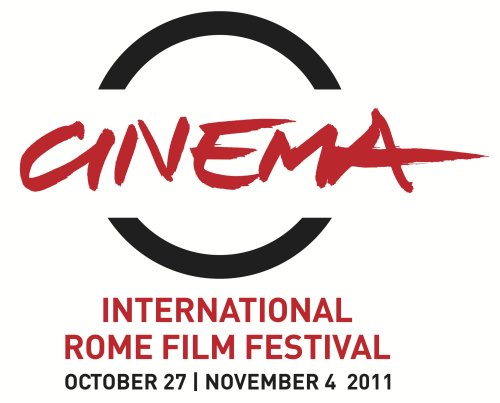
The International Rome Film Festival is in its 6th edition and, once again, as is now its most substantial tradition, the festival offers a wide selection of movies that go from Hollywood mainstream to the most obscure of emerging filmmakers, with a constant that is this festival's pride: its total openness to the audience, offering everything from free screenings to affordable tickets for conferences and even the most glamorous of premieres.
The ICS is at the Rome Film Festival for the first time this year, so let's take a quick look at some of the highlights of this edition before going into detail about a few of the movies we were able to see.
 The official competition line-up has everything from European horror flick Babycall, starring Noomi Rapace, to a romantic comedy about the invention of the vibrator in 1880s London, Hysteria, starring Maggie Gyllenhaal, Hugh Dancy and Rupert Everett. Italy is naturally very present with veteran filmmaker Pupi Avati (Il Cuore Grande delle Ragazze – The Big Heart of Girls), documentarist Pippo Mezzapesa's first full-length fictional movie Il Paese delle Spose Infelici and the comedy La Kryptonite nella Borsa. The international selection also includes the German Hotel Lux, the Korean Poongsan (produced by Kim Ki-Duk), Cedric Khan's Une Vie Meilleure – A Better Life, and the prestigious adaptation of Patrick White's The Eye of the Storm, among others.
The official competition line-up has everything from European horror flick Babycall, starring Noomi Rapace, to a romantic comedy about the invention of the vibrator in 1880s London, Hysteria, starring Maggie Gyllenhaal, Hugh Dancy and Rupert Everett. Italy is naturally very present with veteran filmmaker Pupi Avati (Il Cuore Grande delle Ragazze – The Big Heart of Girls), documentarist Pippo Mezzapesa's first full-length fictional movie Il Paese delle Spose Infelici and the comedy La Kryptonite nella Borsa. The international selection also includes the German Hotel Lux, the Korean Poongsan (produced by Kim Ki-Duk), Cedric Khan's Une Vie Meilleure – A Better Life, and the prestigious adaptation of Patrick White's The Eye of the Storm, among others.
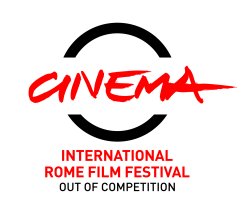 The out of competition highlights include the outrageous Australian comedy A Few Best Men, directed by Priscilla's Stephan Elliott, legendary Italian filmmaker Giuliano Cataldo's political drama L'Industriale – The Industrialist, Luc Besson's The Lady, the French romantic comedy Mon Pire Cauchemar – My Worst Nightmare, starring Isabelle Huppert, Oscar-buzzed biopic My Week with Marilyn and the American romance Like Crazy, starring Anton Yelchin and this year's Rome Film Fest revelation Felicity Jones (also starring in Hysteria).
The out of competition highlights include the outrageous Australian comedy A Few Best Men, directed by Priscilla's Stephan Elliott, legendary Italian filmmaker Giuliano Cataldo's political drama L'Industriale – The Industrialist, Luc Besson's The Lady, the French romantic comedy Mon Pire Cauchemar – My Worst Nightmare, starring Isabelle Huppert, Oscar-buzzed biopic My Week with Marilyn and the American romance Like Crazy, starring Anton Yelchin and this year's Rome Film Fest revelation Felicity Jones (also starring in Hysteria).
 Alice nella Città – Alice in the City, the festival's section dedicated to movies directed towards a younger audience and often one of the fest's best selections, this year includes the Italian premiere of Steven Spielberg's The Adventures of Tintin, previews of Martin Scorsese's Hugo and The Twilight Saga: Breaking Dawn Part I, as well as smaller films like the Belgian gay teen drama Noordzee Texas – North Sea Texas, based on a hit young adult novel, Death of a Superhero starring Andy Serkis and the American dramedy Jesus Henry Christ
Alice nella Città – Alice in the City, the festival's section dedicated to movies directed towards a younger audience and often one of the fest's best selections, this year includes the Italian premiere of Steven Spielberg's The Adventures of Tintin, previews of Martin Scorsese's Hugo and The Twilight Saga: Breaking Dawn Part I, as well as smaller films like the Belgian gay teen drama Noordzee Texas – North Sea Texas, based on a hit young adult novel, Death of a Superhero starring Andy Serkis and the American dramedy Jesus Henry Christ
.
 This year's Focus selection is on British cinema and it's aptly called "Punks and Patriots," as seven personalities of the British film industry (including Tilda Swinton, David Hare, Terence Davies and Michael Nyman) were asked to choose two films each that best represent the rebellious and traditional opposites of England. The result is a retrospective that includes Ealing classics like The Ladykillers as well as Powell & Pressburger's A Matter of Life and Death and The Canterbury Tales, The Pumpkin Eater, Sunday Bloody Sunday, My Beautiful Laundrette and others. The new releases presented during the Focus include Terence Davies' own The Deep Blue Sea starring Rachel Weisz, Paddy Considine's directorial debut Tyrannosaur, Michael Winterbottom's Trishna and the queer cinema sensation of the year, Weekend, among others.
This year's Focus selection is on British cinema and it's aptly called "Punks and Patriots," as seven personalities of the British film industry (including Tilda Swinton, David Hare, Terence Davies and Michael Nyman) were asked to choose two films each that best represent the rebellious and traditional opposites of England. The result is a retrospective that includes Ealing classics like The Ladykillers as well as Powell & Pressburger's A Matter of Life and Death and The Canterbury Tales, The Pumpkin Eater, Sunday Bloody Sunday, My Beautiful Laundrette and others. The new releases presented during the Focus include Terence Davies' own The Deep Blue Sea starring Rachel Weisz, Paddy Considine's directorial debut Tyrannosaur, Michael Winterbottom's Trishna and the queer cinema sensation of the year, Weekend, among others.
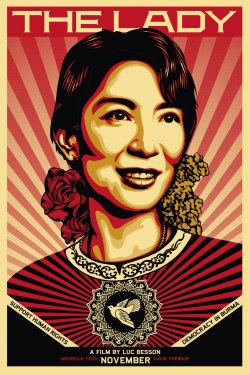
Luc Besson's The Lady was the opening film and was welcomed warmly by the critics here at the festival. The story of Aung San Suu Kyi is a well-known tale of courage and struggle against terror. It's a story that could have been told in many different ways, from cinéma vérité to an inspiring Hollywood-sized story of the David vs Goliath kind. When it was announced that Luc Besson would be the one to take this story to the big screen there were some definite concerns about what his particular approach would be.
A story as powerful and politically involved as Aung San Suu Kyi's seemed like a bad fit for a director mainly known for his action and sci-fi movies. And in many ways it is a bad fit – Besson never tries to hide the fact that he's new to this kind of material, and never tries to go beyond standard biopic fare when it comes to visuals and narrative. Everything is very straightforward and polished and includes the ABC of biopics, from foreboding moments to big music with way too much grandeur.
What is rather peculiar and intriguing about this film, however, is that Besson's insecurities have led him to a truly emotional approach that is often forgotten in this genre. Besson, who enthused an audience of cynical journalists, wearing an Aung San Suu Kyi / The Lady shirt and a free Burma wristband at the press conference, explicitly said that the political aspect of the story, while certainly pivotal, was used as more of a background to the personal story of an extraordinarily brave woman, wife and mother.
In the director's own words, what he wanted to learn from the script was "How can you leave your husband and child?" and his personal journey through the story of the Burmese Nobel Prize-winner was one of critical discovery and endless questions about how her actions reflected on the lives of those she loves.

That perhaps naive, but sincere approach has turned The Lady into a truly emotional and touching experience, also thanks to a gracious performance by Michelle Yeoh, who inhabits the character with the elegance, the heartwarming smile and light disposition that the world has learned to love about Aung San Suu Kyi. David Thewlis, as the long-suffering husband, delivers a grounded performance that is the perfect counterpart to Yeoh's levity of presence, and the combination of the two very different acting styles is the source of moments of intense emotion.
In these hands The Lady might not be the most original of movies, but its honesty provides for most of what's needed to make it an earnest tribute to Aung San Suu Kyi. Michelle Yeoh said that many students who were shown the movie thanked her afterwards because they never really knew who Aung San Suu Kyi was, and their newfound awareness of her, her work and the Burmese situation may be the biggest contribution of the movie to her fight against fear.
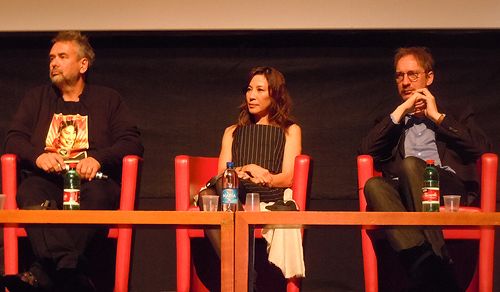
Exclusive ICS picture of Luc Besson, Michelle Yeoh and David Thewlis at The Lady press conference in Rome
And a few more brief thoughts about some of the most interesting movies we saw.

Drake Doremus' Like Crazy was presented out of competition. The movie is a romance of the heart-wrenching kind, one that lifts the audience up to a crest of high school fantasy love only to crush any kind of romantic hope by the end. Anton Yelchin and Felicity Jones are both very good at delivering insecure, frightened performances, playing two kids completely lost in one another but unable to fulfill their longing. It's a sad film, there's no other definition for it, and although simple in its narrative it also manages to utilize some romantic melodrama cliches effectively, especially when dealing with the contrast between an idealized memory of lost young love and the dreary reality of a maturity that is often fought by the protagonists, but that overwhelms them in the end.
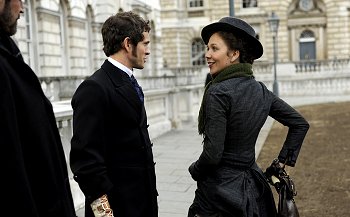
Tanya Wexler's Hysteria is an amusing costume romcom that explicitly never tries to be anything deeper, even when dealing with complex themes like the independence of women in Victorian England. It is a movie about the invention of the vibrator in 1880s London and it is as funny and awkward as it sounds. Maggie Gyllenhaal admitted during the press conference that she decided to play her character, a rebellious young woman who overcomes the oppressive morals of her family, in a very anachronistic way; she wanted to make her a savage and she succeeds in delivering a fun, energetic performance.
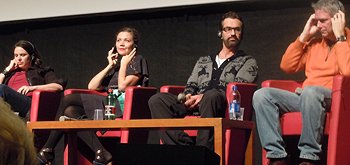
Exclusive ICS picture of Tanya Wexler, Maggie Gyllenhaal, Rupert Everett and screenwriter Stephen Dyer at the Hysteria press conference in Rome
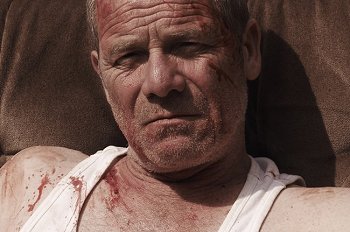
Paddy Considine's directorial debut Tyrannosaur, the story of two lost souls finding one another in a world of utter violence and one of the best films seen so far, is a tough reflection on the nature of violence. Peter Mullan plays his character with vigor and manages to create a performance that makes the audience's job very difficult – we're never able to forgive the character's actions, but at the same time we're moved by his story, a narrative that only partially explains his irrational violence but gives a level of affecting humanity to his whole dreary world.
